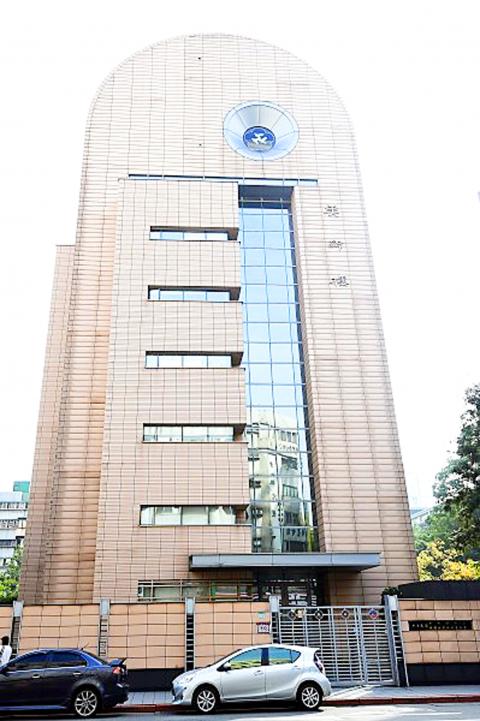The National Women’s League (NWL) collected billions of New Taiwan dollars in military taxes and surcharges from 1955 to 1989, with the sum estimated to be worth nearly NT$350 billion (US$11.5 billion at the current exchange rate) in today’s terms, the Ill-gotten Party Assets Settlement Committee said yesterday.
A major recipient of the so-called military taxes and surcharges — eight different types of taxes, electricity bills and import duties — the league collected an estimated NT$24.03 billion during that period, which, factoring in inflation and interest, would be equivalent to NT$349.81 billion today, committee spokeswoman Shih Chin-fang (施錦芳) said.
The estimates were based on financial records kept by the Friends of Armed Forces Association, another recipient of the military taxes and surcharges that shared the tax revenue with the league.

Photo: Chen Chih-chu, Taipei Times
According to association data, the league was entitled to two-thirds of the tax revenue — excluding the amounts given to the General Chamber of Commerce, the Chinese National Federation of Industries, and importer and exporter organizations at local levels — while the association received the remaining third.
From 1955 to 1989 when the taxes and surcharges were levied, estimated tax revenue totaled NT$95.62 billion, which would be equivalent to NT$1.39 trillion today.
Shih said the tax revenue is an estimated value because the military taxes and surcharges were special duties collected by banks and business organizations, and never went into state coffers.
“Although the league has only provided partial records without detailed financial reports, data kept by the association are fairly complete, so the estimate should be reasonably accurate,” she said.
The league said it had used the money to organize entertainment events and build housing for military personnel and their dependents.
The committee is seeking to verify the league’s claim and how much was spent on housing.
It is to hold a hearing on Thursday next week as part of its investigation into the links between the league and the Chinese Nationalist Party (KMT).
The KMT decided how the tax revenue should be shared between the league and the association, and the party was responsible for including the league’s funding in government budgets.
“The league received all its government subsidies via the KMT. A property on Linsen S Road [in Taipei’s Zhongzheng District (中正)] was first acquired by the KMT and then donated to the league,” Shih said.
“The [financial] links between the league and the KMT should be convincing evidence to prove their affiliation,” Shih said.
The league has NT$38 billion in assets, mostly in cash, and relies on interest and stock dividends for income, she added.
Should the league be determined to be a KMT affiliate and operated using ill-gotten party assets, the league would be asked to return its assets to the state.

Right-wing political scientist Laura Fernandez on Sunday won Costa Rica’s presidential election by a landslide, after promising to crack down on rising violence linked to the cocaine trade. Fernandez’s nearest rival, economist Alvaro Ramos, conceded defeat as results showed the ruling party far exceeding the threshold of 40 percent needed to avoid a runoff. With 94 percent of polling stations counted, the political heir of outgoing Costa Rican President Rodrigo Chaves had captured 48.3 percent of the vote compared with Ramos’ 33.4 percent, the Supreme Electoral Tribunal said. As soon as the first results were announced, members of Fernandez’s Sovereign People’s Party

MORE RESPONSIBILITY: Draftees would be expected to fight alongside professional soldiers, likely requiring the transformation of some training brigades into combat units The armed forces are to start incorporating new conscripts into combined arms brigades this year to enhance combat readiness, the Executive Yuan’s latest policy report said. The new policy would affect Taiwanese men entering the military for their compulsory service, which was extended to one year under reforms by then-president Tsai Ing-wen (蔡英文) in 2022. The conscripts would be trained to operate machine guns, uncrewed aerial vehicles, anti-tank guided missile launchers and Stinger air defense systems, the report said, adding that the basic training would be lengthened to eight weeks. After basic training, conscripts would be sorted into infantry battalions that would take

EMERGING FIELDS: The Chinese president said that the two countries would explore cooperation in green technology, the digital economy and artificial intelligence Chinese President Xi Jinping (習近平) yesterday called for an “equal and orderly multipolar world” in the face of “unilateral bullying,” in an apparent jab at the US. Xi was speaking during talks in Beijing with Uruguayan President Yamandu Orsi, the first South American leader to visit China since US special forces captured then-Venezuelan president Nicolas Maduro last month — an operation that Beijing condemned as a violation of sovereignty. Orsi follows a slew of leaders to have visited China seeking to boost ties with the world’s second-largest economy to hedge against US President Donald Trump’s increasingly unpredictable administration. “The international situation is fraught

GROWING AMBITIONS: The scale and tempo of the operations show that the Strait has become the core theater for China to expand its security interests, the report said Chinese military aircraft incursions around Taiwan have surged nearly 15-fold over the past five years, according to a report released yesterday by the Democratic Progressive Party’s (DPP) Department of China Affairs. Sorties in the Taiwan Strait were previously irregular, totaling 380 in 2020, but have since evolved into routine operations, the report showed. “This demonstrates that the Taiwan Strait has become both the starting point and testing ground for Beijing’s expansionist ambitions,” it said. Driven by military expansionism, China is systematically pursuing actions aimed at altering the regional “status quo,” the department said, adding that Taiwan represents the most critical link in China’s